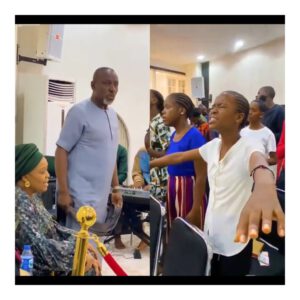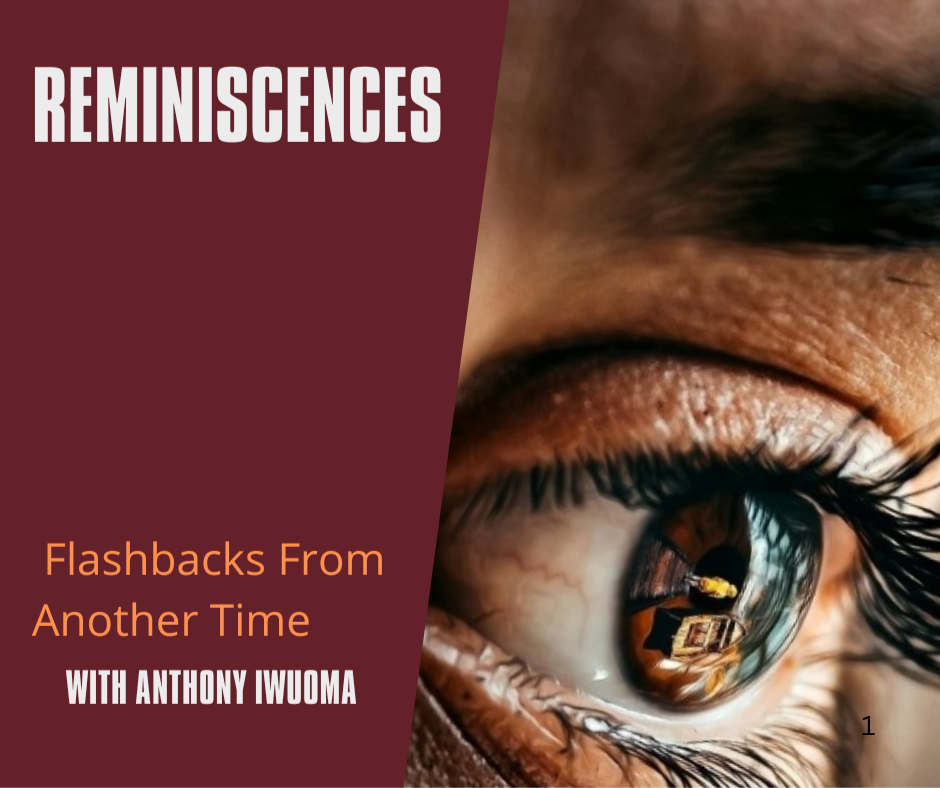
By Anthony Iwuoma
Kindly share:
 And it came to pass, that Owelle of Ogboko,
And it came to pass, that Owelle of Ogboko,
builder of statues and collector of roundabouts,
did suddenly see the light.
Not PHCN light, not solar light, but born-again light.
He raised a church, “Rochas International Gospel Assembly Unlimited,”
where tithe is legal tender
and offering basket comes with receipt for “federal character.”
But the congregation of Imo cried with one voice:
“Pastor Rochas, shall a man build cathedrals in Abuja,
yet evacuate Nsu tiles factory as if it were a shrine?
Shall restitution not follow repentance?”
Owelle smiled and declared:
“Brethren, heaven is paved with gold,
so who am I to return ordinary Naira and kobo?
Verily, verily I say unto you: my loot is tithe in advance!”
And the elders of Imo groaned,
for the equipment of Nsu still lies in exile,
awaiting resurrection on a day only EFCC knows.
Thus, the gospel of Rochas continues:
A church here, a statue there,
and a promise of tomorrow that never comes.
Chapter One: The Coming of Owelle
1. And it came to pass in the days of waiting that the people of Imo cried out for a deliverer.
2. And there arose one called Owelle, son of Ogboko, who lifted up his voice in the marketplace and said, I bring unto thee rescue mission, I bring unto thee salvation.
3. And his tongue was coated with honey, and his promises were as rivers of milk and honey.
4. And he said, I shall give unto thee free education, free health, free salaries, free markets, free everything.
5. And he swore with a loud oath, I shall make Imo the Dubai of Africa, the Jerusalem of prosperity, the China of industry.
6. And the people heard him and rejoiced, for they were weary of the days of want.
7. And they lifted their voices and cried, Hosanna, blessed is he that cometh with free things.
8. But they knew not that his gospel was iberiberism.
8. For the words of his mouth were sweet as honey, but the works of his hands were bitter as wormwood.
Chapter Two: The Gospel of Free But Empty
1. And when the children gathered in schools, Owelle spake again, saying,
2. Behold, I have given thee free education.
3. But when they searched for chalk, it was not found. When they looked for teachers, behold, they had fled.
4. The roofs leaked when the rains fell, and goats entered the classrooms.
5. And the people asked, Is this the free education promised unto us?
6. And he answered them not, for iberiberism had hardened his heart.
7. Then he spake unto the traders, saying, Behold, I give thee free markets.
8. But behold, bulldozers descended upon their stalls, and their goods were scattered as ashes.
9. And the women wept, crying, Our labour is swallowed, our sweat is consumed by fire.
10. Yet Owelle lifted his hands and declared, It is free indeed.
11. And unto the workers he said, I give thee free salaries.
12. But months rolled as a stubborn wheel, and no wage was paid.
13. And hunger entered their homes as an uninvited guest.
14. Then the elders said, This is not free, this is empty.
Chapter Three: The Doctrine of Iberiberism
1. And Owelle proclaimed a new teaching in the land.
2. He said, Iberiberism is the wisdom of foolishness and the foolishness of wisdom.
3. And when the people sought explanation, he answered them not with sense but with riddles.
4. And he called his critics iberibe, mocking them before the multitude.
5. And his disciples clapped, though their bellies were empty.
6. And it was established: iberiberism became not only a word but a government, a policy, and a curse.
7. For sense was buried, and nonsense was exalted.
8. And the people groaned, saying, Surely, iberiberism hath descended upon us as a plague.
Chapter Four: The Statues of Vanity
1. And it came to pass that instead of industries, Owelle built statues.
2. He raised the image of Jacob Zuma of South Africa, even while Zuma wrestled with corruption in his own land.
3. He raised the statue of Ellen Sirleaf, though Imo mothers cried for rice.
4. He built the image of foreign queens, of generals unknown, and of strangers who knew not Imo.
5. And the people looked upon the statues and cried, Shall a man eat concrete? Shall bronze boil yam or put meat in the pot?
6. And they laughed with sorrow, saying, Our governor hath become the high priest of statues.
7. And Owelle lifted his shoulders and answered not, for iberiberism had blinded his sight.
Chapter Five: The Betrayal of Nsu Tiles
1. Now there was in Ehime Mbano the factory of Nsu Tiles, a treasure of old, the glory of industry, and the hope of the youths.
2. For in the days of the fathers, it was built to make the land prosper and to give work unto many hands.
3. And the people awaited its revival, saying, Surely Owelle shall breathe life into this inheritance.
4. But behold, he sent men in the night, who carried away its machines as locusts devour a vineyard.
5. The factory was left barren, its halls silent, and its chimneys cold.
6. And the youths cried with a loud voice, Where are the engines of our tomorrow?
7. But silence answered them, for the machines had been swallowed up.
8. And to this day, Nsu Tiles lieth desolate, waiting for a resurrection that hath not come.
Chapter Six: The Loot and the Laughter
1. And Owelle multiplied riches unto himself.
2. Estates rose in his name, hotels flourished in his shadow, and accounts swelled beyond measure.
3. Yet pensioners fainted by the roadside, unpaid and forgotten.
4. Teachers begged bread in the markets, and youths roamed the streets idle.
5. And the elders cried, Owelle, why hast thou swallowed the harvest of thy people?
6. But he answered them, saying, It is Rescue Mission.
7. And he laughed a mighty laugh, while the people wept.
Chapter Seven: The Senatorial Throne at Gunpoint
1. And when the days of his reign were ended, Owelle set his eyes upon the Red Chamber, desiring a senatorial crown.
2. And behold, the day of election came, but not by ballot did he prevail, but by barrel.
3. For men with guns walked among the booths, and the will of the people was silenced by fear.
4. And it was proclaimed across the land, Owelle hath won.
But the people whispered one to another, 5. This is victory at gunpoint.
6. And the heavens shook with laughter, for democracy had been mocked in broad daylight.
Chapter Eight: The New Gospel of Born Again
1. But when the watchers of the land pursued him, and the EFCC hammered his gates, Owelle found a new gospel.
2. He lifted his hands in holy places, saying, Behold, I am born again.
3. And he planted a church, named it after his family and mounted a pulpit.
4. And he spake of grace and salvation, of heaven and redemption.
5. And the people marveled, saying, Is this the same Owelle who devoured our inheritance; is Saul also among the prophets?
6. And they asked, Shall a man plunder the flock and still preach unto them? Shall repentance be without restitution?
7. For it is written, By their fruits ye shall know them.
Chapter Nine: The Warning of Nebuchadnezzar
1. And the people asked, Is Owelle for real, or doth he mock God?
2. For none mock God and get away, for it is written, Be not deceived, God is not mocked; whatsoever a man soweth, that shall he also reap.
3. Behold Nebuchadnezzar, king of Babylon, who exalted himself above measure.
4. He was driven into the fields, and he ate grass as oxen, until he confessed that the Most High ruleth over the kingdoms of men.
5. So also shall every man who exalteth himself with fraud, and maketh jest of salvation, be humbled in due season.
6. For repentance without restitution is vanity, and sermons without fruits are statues without breath.
7. And he that planteth a church while hiding loot in his bosom mocketh the Lord of heaven.
8. But God is not mocked, for judgment tarrieth not forever.
Chapter Ten: The Call for Restitution
1. If Owelle be truly born again, let him prove it by fruits.
2. For he is no longer governor, neither doth power sit upon his shoulders.
3. Yet the treasures of Imo cry from his barns, and the looted inheritance sleepeth in his storehouses.
4. Let him restore what he hath gathered unto himself, that the land may find healing.
5. Let him return the machines of Nsu Tiles, for they were not given unto him but unto generations unborn.
6. Let him open his vaults to pensioners who faint, for their labour was not in vain.
7. Let him confess his works of iberiberism before men, and humble himself before God.
8. For restitution is the true mark of repentance, and humility the garment of salvation.
9. He cannot build again, for his throne is gone; but he can restore, for his conscience remaineth.
Chapter Eleven: The People’s Prayer
1. And the people of Imo lifted their voices, saying, O Lord, remember thy word: thou art not mocked.
2. Judge between us and our rulers, that truth may rise from the ashes of iberiberism.
3. If Rochas be sincere, let his fruits show; but if he mocketh Thee, let his deceit return upon his own head.
4. Deliver us from leaders who swallow our heritage, and then raise altars with our spoils.
5. Restore unto us a new day, when righteousness shall sit in Government House, and justice in the marketplace.
6. And the heavens heard their cry, and the angels took record in their books.
Chapter Twelve: The Epistle of Tomorrow
1. Thus is the Book of Rochas written, as a testimony and a warning.
Power hath departed from him, yet accountability hath not.
2. For every man shall answer for the works of his hands, whether in office or out of office.
3. Behold Nebuchadnezzar, who lifted himself high, yet was cast down to eat grass.
4. Even so shall every man who mocketh God be humbled, until he learneth that the Most High ruleth in the affairs of men.
5. Let the people remember, lest they fall again into the pit of iberiberism.
6. And let Rochas consider, whether he shall walk in repentance unto life, or in pride unto judgment.
7. For God is not mocked: whatsoever a man soweth, that shall he also reap.






